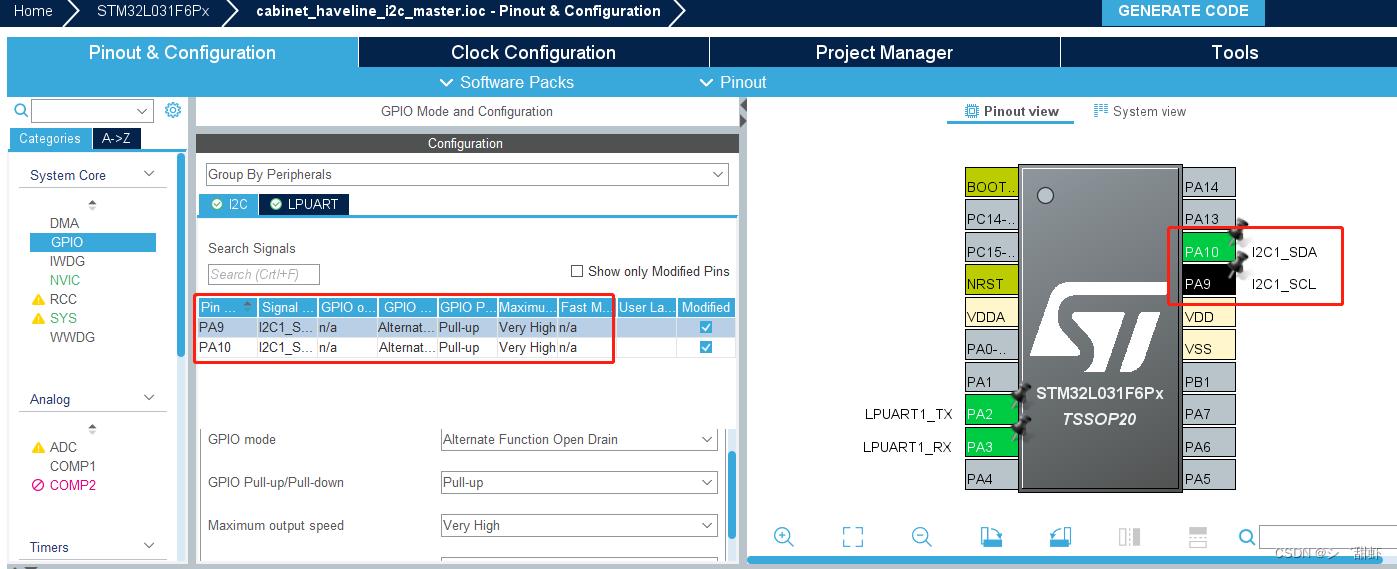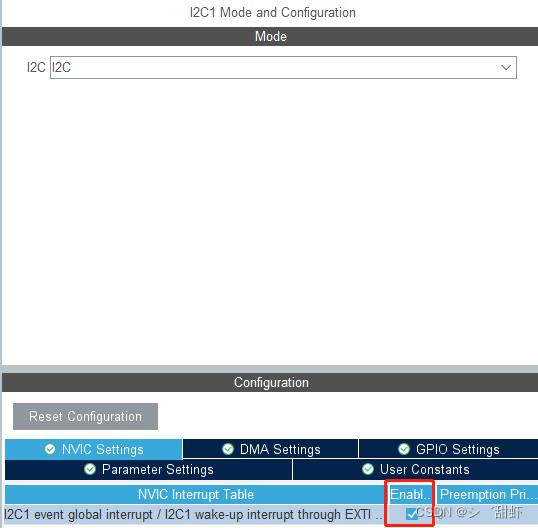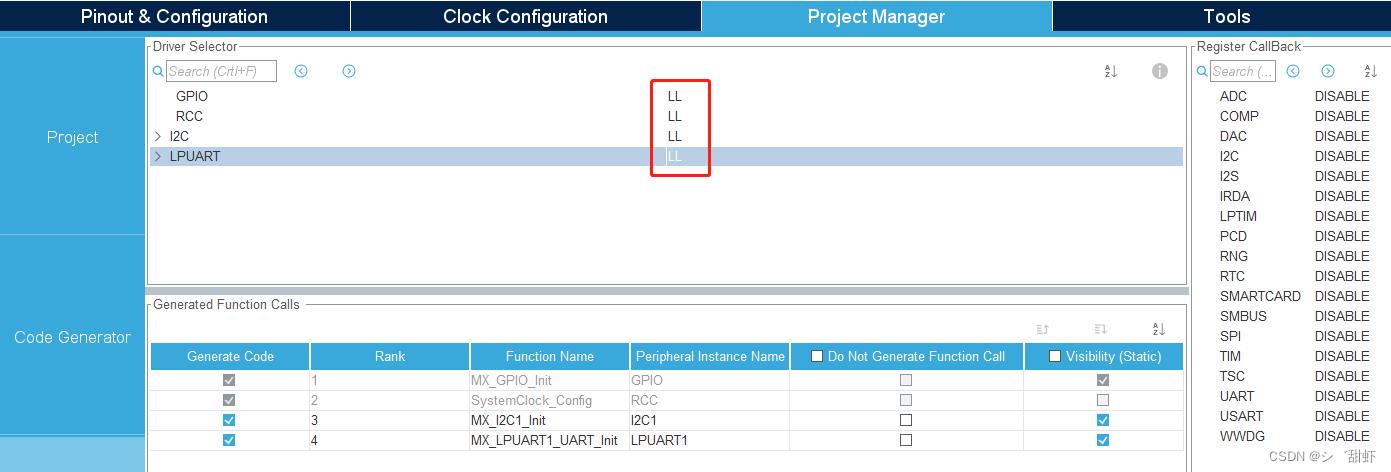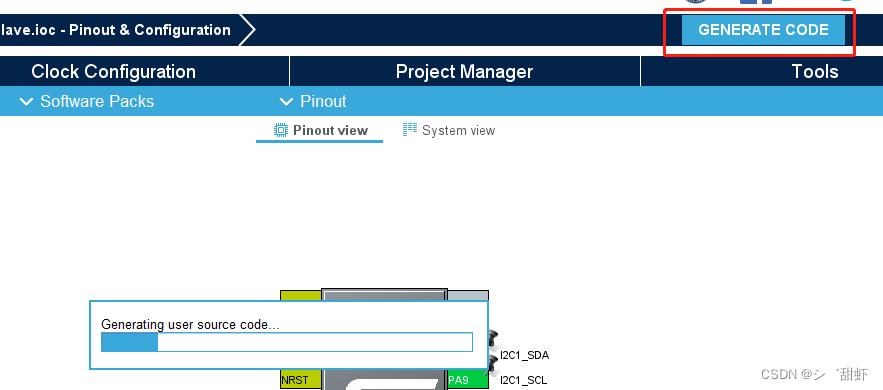STM32L031F6 LL库硬件I2C使用,中断模式
Posted 花开花落的个人博客
tags:
篇首语:本文由小常识网(cha138.com)小编为大家整理,主要介绍了STM32L031F6 LL库硬件I2C使用,中断模式相关的知识,希望对你有一定的参考价值。
最近用到了I2C,之前都是用软件模拟I2C,听说硬件I2C已经比之前好用了,这次决定尝试一下
代码和cube工程下载地址
stm32l053硬件i2c发送接收程序-C文档类资源-CSDN下载
一、创建测试工程I2C MASTER
配置上拉,串口用来查看调试信息

I2C模式使能中断

配置LL库

配置你使用的开发工具

生成代码

二、创建测试工程I2C SLAVE
配置上拉,串口用来查看调试信息,配置与MASTER相同即可,硬件I2C的2个IO口直连
三、 MASTER代码编写
master是主动请求,slave用中断处理所有操作,这里把主要代码贴出来
i2c.c
/**
******************************************************************************
* @file i2c.c
* @brief This file provides code for the configuration
* of the I2C instances.
******************************************************************************
* @attention
*
* <h2><center>© Copyright (c) 2022 STMicroelectronics.
* All rights reserved.</center></h2>
*
* This software component is licensed by ST under BSD 3-Clause license,
* the "License"; You may not use this file except in compliance with the
* License. You may obtain a copy of the License at:
* opensource.org/licenses/BSD-3-Clause
*
******************************************************************************
*/
/* Includes ------------------------------------------------------------------*/
#include "i2c.h"
/* USER CODE BEGIN 0 */
/* USER CODE END 0 */
/* I2C1 init function */
void MX_I2C1_Init(void)
/* USER CODE BEGIN I2C1_Init 0 */
/* USER CODE END I2C1_Init 0 */
LL_I2C_InitTypeDef I2C_InitStruct = 0;
LL_GPIO_InitTypeDef GPIO_InitStruct = 0;
LL_IOP_GRP1_EnableClock(LL_IOP_GRP1_PERIPH_GPIOA);
/**I2C1 GPIO Configuration
PA9 ------> I2C1_SCL
PA10 ------> I2C1_SDA
*/
GPIO_InitStruct.Pin = LL_GPIO_PIN_9;
GPIO_InitStruct.Mode = LL_GPIO_MODE_ALTERNATE;
GPIO_InitStruct.Speed = LL_GPIO_SPEED_FREQ_VERY_HIGH;
GPIO_InitStruct.OutputType = LL_GPIO_OUTPUT_OPENDRAIN;
GPIO_InitStruct.Pull = LL_GPIO_PULL_UP;
GPIO_InitStruct.Alternate = LL_GPIO_AF_1;
LL_GPIO_Init(GPIOA, &GPIO_InitStruct);
GPIO_InitStruct.Pin = LL_GPIO_PIN_10;
GPIO_InitStruct.Mode = LL_GPIO_MODE_ALTERNATE;
GPIO_InitStruct.Speed = LL_GPIO_SPEED_FREQ_VERY_HIGH;
GPIO_InitStruct.OutputType = LL_GPIO_OUTPUT_OPENDRAIN;
GPIO_InitStruct.Pull = LL_GPIO_PULL_UP;
GPIO_InitStruct.Alternate = LL_GPIO_AF_1;
LL_GPIO_Init(GPIOA, &GPIO_InitStruct);
/* Peripheral clock enable */
LL_APB1_GRP1_EnableClock(LL_APB1_GRP1_PERIPH_I2C1);
/* I2C1 interrupt Init */
NVIC_SetPriority(I2C1_IRQn, 0);
NVIC_EnableIRQ(I2C1_IRQn);
/* USER CODE BEGIN I2C1_Init 1 */
/* USER CODE END I2C1_Init 1 */
/** I2C Initialization
*/
LL_I2C_EnableAutoEndMode(I2C1);
LL_I2C_DisableOwnAddress2(I2C1);
LL_I2C_DisableGeneralCall(I2C1);
LL_I2C_EnableClockStretching(I2C1);
I2C_InitStruct.PeripheralMode = LL_I2C_MODE_I2C;
I2C_InitStruct.Timing = 0x00000708;
I2C_InitStruct.AnalogFilter = LL_I2C_ANALOGFILTER_ENABLE;
I2C_InitStruct.DigitalFilter = 0;
I2C_InitStruct.OwnAddress1 = 0x01;
I2C_InitStruct.TypeAcknowledge = LL_I2C_ACK;
I2C_InitStruct.OwnAddrSize = LL_I2C_OWNADDRESS1_7BIT;
LL_I2C_Init(I2C1, &I2C_InitStruct);
LL_I2C_SetOwnAddress2(I2C1, 0, LL_I2C_OWNADDRESS2_NOMASK);
/* USER CODE BEGIN I2C1_Init 2 */
LL_I2C_EnableSMBusAlert(I2C1);
LL_I2C_EnableOwnAddress1(I2C1); //
LL_I2C_Enable(I2C1);
/* Listen IT */
// LL_I2C_EnableIT_ADDR(I2C1);
// LL_I2C_EnableIT_NACK(I2C1);
// LL_I2C_EnableIT_ERR(I2C1);
// LL_I2C_EnableIT_STOP(I2C1);
/* USER CODE END I2C1_Init 2 */
/* USER CODE BEGIN 1 */
/* USER CODE END 1 */
/************************ (C) COPYRIGHT STMicroelectronics *****END OF FILE****/
发送和读取i2c数据在主函数中,这里用的是软件停止位,同样可以使用自动停止位LL_I2C_MODE_AUTOEND,使用自动停止位不需要主动发送停止
/* USER CODE BEGIN Header */
/**
******************************************************************************
* @file : main.c
* @brief : Main program body
******************************************************************************
* @attention
*
* <h2><center>© Copyright (c) 2022 STMicroelectronics.
* All rights reserved.</center></h2>
*
* This software component is licensed by ST under BSD 3-Clause license,
* the "License"; You may not use this file except in compliance with the
* License. You may obtain a copy of the License at:
* opensource.org/licenses/BSD-3-Clause
*
******************************************************************************
*/
/* USER CODE END Header */
/* Includes ------------------------------------------------------------------*/
#include "main.h"
#include "i2c.h"
#include "usart.h"
#include "gpio.h"
/* Private includes ----------------------------------------------------------*/
/* USER CODE BEGIN Includes */
#include <stdio.h>
/* USER CODE END Includes */
/* Private typedef -----------------------------------------------------------*/
/* USER CODE BEGIN PTD */
/* USER CODE END PTD */
/* Private define ------------------------------------------------------------*/
/* USER CODE BEGIN PD */
/* USER CODE END PD */
/* Private macro -------------------------------------------------------------*/
/* USER CODE BEGIN PM */
/* USER CODE END PM */
/* Private variables ---------------------------------------------------------*/
/* USER CODE BEGIN PV */
/* USER CODE END PV */
/* Private function prototypes -----------------------------------------------*/
void SystemClock_Config(void);
/* USER CODE BEGIN PFP */
/* USER CODE END PFP */
/* Private user code ---------------------------------------------------------*/
/* USER CODE BEGIN 0 */
/* USER CODE END 0 */
/**
* @brief The application entry point.
* @retval int
*/
int main(void)
/* USER CODE BEGIN 1 */
uint16_t i = 0;
int timeOut = 0;
/* USER CODE END 1 */
/* MCU Configuration--------------------------------------------------------*/
/* Reset of all peripherals, Initializes the Flash interface and the Systick. */
LL_APB2_GRP1_EnableClock(LL_APB2_GRP1_PERIPH_SYSCFG);
LL_APB1_GRP1_EnableClock(LL_APB1_GRP1_PERIPH_PWR);
/* System interrupt init*/
/* SysTick_IRQn interrupt configuration */
NVIC_SetPriority(SysTick_IRQn, 3);
/* USER CODE BEGIN Init */
/* USER CODE END Init */
/* Configure the system clock */
SystemClock_Config();
/* USER CODE BEGIN SysInit */
/* USER CODE END SysInit */
/* Initialize all configured peripherals */
MX_GPIO_Init();
MX_I2C1_Init();
MX_LPUART1_UART_Init();
/* USER CODE BEGIN 2 */
LL_LPUART_Enable(LPUART1);
printf("Init Ok!\\r\\n");
/* USER CODE END 2 */
/* Infinite loop */
/* USER CODE BEGIN WHILE */
while (1)
LL_mDelay(5000);
LL_I2C_HandleTransfer(I2C1, 0x10, LL_I2C_ADDRSLAVE_7BIT, 10, LL_I2C_MODE_SOFTEND, LL_I2C_GENERATE_START_WRITE);
printf("I2C Send Data:\\t");
for(i=0;i<10;i++)
LL_mDelay(1);
while(!LL_I2C_IsActiveFlag_TXIS(I2C1))
LL_mDelay(1);
timeOut++;
if(timeOut>100)
timeOut = 0;
break;
LL_I2C_TransmitData8(I2C1,(uint8_t)i);
printf("%x\\t",(uint8_t)i);
printf("\\r\\nI2C Recv Data:\\t");
LL_mDelay(10);
LL_I2C_HandleTransfer(I2C1, 0x10, LL_I2C_ADDRSLAVE_7BIT, 0, LL_I2C_MODE_SOFTEND,LL_I2C_GENERATE_STOP);
LL_mDelay(50);
LL_I2C_HandleTransfer(I2C1, 0x10, LL_I2C_ADDRSLAVE_7BIT, 10, LL_I2C_MODE_SOFTEND,LL_I2C_GENERATE_START_READ);
for(i=0;i<10;i++)
LL_mDelay(1);
while(!LL_I2C_IsActiveFlag_RXNE(I2C1))
LL_mDelay(1);
timeOut++;
if(timeOut>100)
timeOut = 0;
break;
printf("%x\\t",LL_I2C_ReceiveData8(I2C1));
printf("\\r\\n");
LL_mDelay(10);
LL_I2C_HandleTransfer(I2C1, 0x10, LL_I2C_ADDRSLAVE_7BIT, 0, LL_I2C_MODE_SOFTEND,LL_I2C_GENERATE_STOP);
// LL_I2C_HandleTransfer(I2C1, 0x00, LL_I2C_ADDRSLAVE_7BIT, 2, LL_I2C_MODE_AUTOEND, LL_I2C_GENERATE_START_WRITE);
//
// while(!LL_I2C_IsActiveFlag_TXIS(I2C1))
//
//
// LL_I2C_TransmitData8(I2C1,0x01);
// while(!LL_I2C_IsActiveFlag_TXIS(I2C1))
//
//
// LL_I2C_TransmitData8(I2C1,0x1f);
//
//
// LL_I2C_HandleTransfer(I2C1, 0x00, LL_I2C_ADDRSLAVE_7BIT, 1, LL_I2C_MODE_AUTOEND,LL_I2C_GENERATE_START_READ);
// while(!LL_I2C_IsActiveFlag_RXNE(I2C1))
//
//
// printf("%x\\r\\n",LL_I2C_ReceiveData8(I2C1));
// LL_I2C_HandleTransfer(I2C1, 0x00, LL_I2C_ADDRSLAVE_7BIT, 1, LL_I2C_MODE_AUTOEND,LL_I2C_GENERATE_START_READ);
// while(!LL_I2C_IsActiveFlag_RXNE(I2C1))
//
//
// printf("%x\\r\\n",LL_I2C_ReceiveData8(I2C1));
/* USER CODE END WHILE */
/* USER CODE BEGIN 3 */
/* USER CODE END 3 */
/**
* @brief System Clock Configuration
* @retval None
*/
void SystemClock_Config(void)
LL_FLASH_SetLatency(LL_FLASH_LATENCY_0);
while(LL_FLASH_GetLatency()!= LL_FLASH_LATENCY_0)
LL_PWR_SetRegulVoltageScaling(LL_PWR_REGU_VOLTAGE_SCALE1);
LL_RCC_MSI_Enable();
/* Wait till MSI is ready */
while(LL_RCC_MSI_IsReady() != 1)
LL_RCC_MSI_SetRange(LL_RCC_MSIRANGE_5);
LL_RCC_MSI_SetCalibTrimming(0);
LL_RCC_SetAHBPrescaler(LL_RCC_SYSCLK_DIV_1);
LL_RCC_SetAPB1Prescaler(LL_RCC_APB1_DIV_1);
LL_RCC_SetAPB2Prescaler(LL_RCC_APB2_DIV_1);
LL_RCC_SetSysClkSource(LL_RCC_SYS_CLKSOURCE_MSI);
/* Wait till System clock is ready */
while(LL_RCC_GetSysClkSource() != LL_RCC_SYS_CLKSOURCE_STATUS_MSI)
LL_Init1msTick(2097000);
LL_SetSystemCoreClock(2097000);
LL_RCC_SetLPUARTClockSource(LL_RCC_LPUART1_CLKSOURCE_PCLK1);
LL_RCC_SetI2CClockSource(LL_RCC_I2C1_CLKSOURCE_PCLK1);
/* USER CODE BEGIN 4 */
/* USER CODE END 4 */
/**
* @brief This function is executed in case of error occurrence.
* @retval None
*/
void Error_Handler(void)
/* USER CODE BEGIN Error_Handler_Debug */
/* User can add his own implementation to report the HAL error return state */
__disable_irq();
while (1)
/* USER CODE END Error_Handler_Debug */
#ifdef USE_FULL_ASSERT
/**
* @brief Reports the name of the source file and the source line number
* where the assert_param error has occurred.
* @param file: pointer to the source file name
* @param line: assert_param error line source number
* @retval None
*/
void assert_failed(uint8_t *file, uint32_t line)
/* USER CODE BEGIN 6 */
/* User can add his own implementation to report the file name and line number,
ex: printf("Wrong parameters value: file %s on line %d\\r\\n", file, line) */
/* USER CODE END 6 */
#endif /* USE_FULL_ASSERT */
/************************ (C) COPYRIGHT STMicroelectronics *****END OF FILE****/
四、 SLAVE代码编写
配置代码
/**
******************************************************************************
* @file i2c.c
* @brief This file provides code for the configuration
* of the I2C instances.
******************************************************************************
* @attention
*
* <h2><center>© Copyright (c) 2022 STMicroelectronics.
* All rights reserved.</center></h2>
*
* This software component is licensed by ST under BSD 3-Clause license,
* the "License"; You may not use this file except in compliance with the
* License. You may obtain a copy of the License at:
* opensource.org/licenses/BSD-3-Clause
*
******************************************************************************
*/
/* Includes ------------------------------------------------------------------*/
#include "i2c.h"
/* USER CODE BEGIN 0 */
/* USER CODE END 0 */
/* I2C1 init function */
void MX_I2C1_Init(void)
/* USER CODE BEGIN I2C1_Init 0 */
/* USER CODE END I2C1_Init 0 */
LL_I2C_InitTypeDef I2C_InitStruct = 0;
LL_GPIO_InitTypeDef GPIO_InitStruct = 0;
LL_IOP_GRP1_EnableClock(LL_IOP_GRP1_PERIPH_GPIOA);
/**I2C1 GPIO Configuration
PA9 ------> I2C1_SCL
PA10 ------> I2C1_SDA
*/
GPIO_InitStruct.Pin = LL_GPIO_PIN_9;
GPIO_InitStruct.Mode = LL_GPIO_MODE_ALTERNATE;
GPIO_InitStruct.Speed = LL_GPIO_SPEED_FREQ_VERY_HIGH;
GPIO_InitStruct.OutputType = LL_GPIO_OUTPUT_OPENDRAIN;
GPIO_InitStruct.Pull = LL_GPIO_PULL_NO;
GPIO_InitStruct.Alternate = LL_GPIO_AF_1;
LL_GPIO_Init(GPIOA, &GPIO_InitStruct);
GPIO_InitStruct.Pin = LL_GPIO_PIN_10;
GPIO_InitStruct.Mode = LL_GPIO_MODE_ALTERNATE;
GPIO_InitStruct.Speed = LL_GPIO_SPEED_FREQ_VERY_HIGH;
GPIO_InitStruct.OutputType = LL_GPIO_OUTPUT_OPENDRAIN;
GPIO_InitStruct.Pull = LL_GPIO_PULL_NO;
GPIO_InitStruct.Alternate = LL_GPIO_AF_1;
LL_GPIO_Init(GPIOA, &GPIO_InitStruct);
/* Peripheral clock enable */
LL_APB1_GRP1_EnableClock(LL_APB1_GRP1_PERIPH_I2C1);
/* I2C1 interrupt Init */
NVIC_SetPriority(I2C1_IRQn, 0);
NVIC_EnableIRQ(I2C1_IRQn);
/* USER CODE BEGIN I2C1_Init 1 */
/* USER CODE END I2C1_Init 1 */
/** I2C Initialization
*/
LL_I2C_EnableAutoEndMode(I2C1);
LL_I2C_DisableOwnAddress2(I2C1);
LL_I2C_DisableGeneralCall(I2C1);
LL_I2C_EnableClockStretching(I2C1);
I2C_InitStruct.PeripheralMode = LL_I2C_MODE_I2C;
I2C_InitStruct.Timing = 0x00000708;
I2C_InitStruct.AnalogFilter = LL_I2C_ANALOGFILTER_ENABLE;
I2C_InitStruct.DigitalFilter = 0;
I2C_InitStruct.OwnAddress1 = 0x10;
I2C_InitStruct.TypeAcknowledge = LL_I2C_ACK;
I2C_InitStruct.OwnAddrSize = LL_I2C_OWNADDRESS1_7BIT;
LL_I2C_Init(I2C1, &I2C_InitStruct);
LL_I2C_SetOwnAddress2(I2C1, 0, LL_I2C_OWNADDRESS2_NOMASK);
/* USER CODE BEGIN I2C1_Init 2 */
LL_I2C_EnableSMBusAlert(I2C1);
LL_I2C_EnableOwnAddress1(I2C1); //
LL_I2C_Enable(I2C1);
/* Listen IT */
LL_I2C_EnableIT_ADDR(I2C1);
LL_I2C_EnableIT_NACK(I2C1);
LL_I2C_EnableIT_ERR(I2C1);
LL_I2C_EnableIT_STOP(I2C1);
/* USER CODE END I2C1_Init 2 */
/* USER CODE BEGIN 1 */
/* USER CODE END 1 */
/************************ (C) COPYRIGHT STMicroelectronics *****END OF FILE****/
主函数里啥也没有
int main(void)
/* USER CODE BEGIN 1 */
/* USER CODE END 1 */
/* MCU Configuration--------------------------------------------------------*/
/* Reset of all peripherals, Initializes the Flash interface and the Systick. */
LL_APB2_GRP1_EnableClock(LL_APB2_GRP1_PERIPH_SYSCFG);
LL_APB1_GRP1_EnableClock(LL_APB1_GRP1_PERIPH_PWR);
/* System interrupt init*/
/* SysTick_IRQn interrupt configuration */
NVIC_SetPriority(SysTick_IRQn, 3);
/* USER CODE BEGIN Init */
/* USER CODE END Init */
/* Configure the system clock */
SystemClock_Config();
/* USER CODE BEGIN SysInit */
/* USER CODE END SysInit */
/* Initialize all configured peripherals */
MX_GPIO_Init();
MX_I2C1_Init();
MX_LPUART1_UART_Init();
/* USER CODE BEGIN 2 */
LL_LPUART_Enable(LPUART1);
printf("Init Ok!\\r\\n");
/* USER CODE END 2 */
/* Infinite loop */
/* USER CODE BEGIN WHILE */
while (1)
LL_mDelay(1000);
/* USER CODE END WHILE */
/* USER CODE BEGIN 3 */
/* USER CODE END 3 */
中断函数
/* USER CODE BEGIN Header */
/**
******************************************************************************
* @file stm32l0xx_it.c
* @brief Interrupt Service Routines.
******************************************************************************
* @attention
*
* <h2><center>© Copyright (c) 2022 STMicroelectronics.
* All rights reserved.</center></h2>
*
* This software component is licensed by ST under BSD 3-Clause license,
* the "License"; You may not use this file except in compliance with the
* License. You may obtain a copy of the License at:
* opensource.org/licenses/BSD-3-Clause
*
******************************************************************************
*/
/* USER CODE END Header */
/* Includes ------------------------------------------------------------------*/
#include "main.h"
#include "stm32l0xx_it.h"
/* Private includes ----------------------------------------------------------*/
/* USER CODE BEGIN Includes */
#include "usart.h"
/* USER CODE END Includes */
/* Private typedef -----------------------------------------------------------*/
/* USER CODE BEGIN TD */
/* USER CODE END TD */
/* Private define ------------------------------------------------------------*/
/* USER CODE BEGIN PD */
/* USER CODE END PD */
/* Private macro -------------------------------------------------------------*/
/* USER CODE BEGIN PM */
/* USER CODE END PM */
/* Private variables ---------------------------------------------------------*/
/* USER CODE BEGIN PV */
/* USER CODE END PV */
/* Private function prototypes -----------------------------------------------*/
/* USER CODE BEGIN PFP */
/* USER CODE END PFP */
/* Private user code ---------------------------------------------------------*/
/* USER CODE BEGIN 0 */
/* USER CODE END 0 */
/* External variables --------------------------------------------------------*/
/* USER CODE BEGIN EV */
int ubReceiveIndex=0;
int ubSendIndex=0;
uint8_t aReceiveBuffer[256];
void Slave_Reception_Callback(void)
uint8_t recvData = LL_I2C_ReceiveData8(I2C1);
printf("ubReceiveIndex:%x,LL_I2C_ReceiveData8:%x\\r\\n",ubReceiveIndex,recvData);
/* Read character in Receive Data register. RXNE flag is cleared by reading data in RXDR register */
aReceiveBuffer[ubReceiveIndex++] = recvData;
void Error_Callback()
uint8_t i=0;
uint8_t data =0;
printf("Error_Callback:");
/* Clear NACKF Flag */
LL_I2C_ClearFlag_NACK(I2C1);
/* Clear STOP Flag */
LL_I2C_ClearFlag_STOP(I2C1);
/* Clear Configuration Register 2, */
I2C1->CR2 &= (uint32_t)~((uint32_t)(I2C_CR2_SADD | I2C_CR2_HEAD10R | I2C_CR2_NBYTES | I2C_CR2_RELOAD | I2C_CR2_RD_WRN));
// for(i=0;i<200;i++)
//
// data = LL_I2C_ReceiveData8(I2C1);
// printf("%x\\t",data);
// if(data == 0x00)
//
// break;
//
//
printf("\\r\\n");
void Slave_Complete_Callback()
uint16_t i=0;
printf("I2C Slave Recv Data\\r\\n");
for(i=0;i<ubReceiveIndex;i++)
printf("%x\\t",aReceiveBuffer[i]);
printf("\\r\\n");
/* USER CODE END EV */
/******************************************************************************/
/* Cortex-M0+ Processor Interruption and Exception Handlers */
/******************************************************************************/
/**
* @brief This function handles Non maskable Interrupt.
*/
void NMI_Handler(void)
/* USER CODE BEGIN NonMaskableInt_IRQn 0 */
/* USER CODE END NonMaskableInt_IRQn 0 */
/* USER CODE BEGIN NonMaskableInt_IRQn 1 */
while (1)
/* USER CODE END NonMaskableInt_IRQn 1 */
/**
* @brief This function handles Hard fault interrupt.
*/
void HardFault_Handler(void)
/* USER CODE BEGIN HardFault_IRQn 0 */
/* USER CODE END HardFault_IRQn 0 */
while (1)
/* USER CODE BEGIN W1_HardFault_IRQn 0 */
/* USER CODE END W1_HardFault_IRQn 0 */
/**
* @brief This function handles System service call via SWI instruction.
*/
void SVC_Handler(void)
/* USER CODE BEGIN SVC_IRQn 0 */
/* USER CODE END SVC_IRQn 0 */
/* USER CODE BEGIN SVC_IRQn 1 */
/* USER CODE END SVC_IRQn 1 */
/**
* @brief This function handles Pendable request for system service.
*/
void PendSV_Handler(void)
/* USER CODE BEGIN PendSV_IRQn 0 */
/* USER CODE END PendSV_IRQn 0 */
/* USER CODE BEGIN PendSV_IRQn 1 */
/* USER CODE END PendSV_IRQn 1 */
/**
* @brief This function handles System tick timer.
*/
void SysTick_Handler(void)
/* USER CODE BEGIN SysTick_IRQn 0 */
/* USER CODE END SysTick_IRQn 0 */
/* USER CODE BEGIN SysTick_IRQn 1 */
/* USER CODE END SysTick_IRQn 1 */
/******************************************************************************/
/* STM32L0xx Peripheral Interrupt Handlers */
/* Add here the Interrupt Handlers for the used peripherals. */
/* For the available peripheral interrupt handler names, */
/* please refer to the startup file (startup_stm32l0xx.s). */
/******************************************************************************/
/**
* @brief This function handles I2C1 event global interrupt / I2C1 wake-up interrupt through EXTI line 23.
*/
void I2C1_IRQHandler(void)
/* USER CODE BEGIN I2C1_IRQn 0 */
if(LL_I2C_IsActiveFlag_ADDR(I2C1))
/* Verify the Address Match with the OWN Slave address */
if(LL_I2C_GetAddressMatchCode(I2C1) == 0x10)
/* Verify the transfer direction, a write direction, Slave enters receiver mode */
if(LL_I2C_GetTransferDirection(I2C1) == LL_I2C_DIRECTION_WRITE)
/* Clear ADDR flag value in ISR register */
LL_I2C_ClearFlag_ADDR(I2C1);
/* Enable Receive Interrupt */
LL_I2C_EnableIT_RX(I2C1);
else
/* Clear ADDR flag value in ISR register */
LL_I2C_ClearFlag_ADDR(I2C1);
LL_I2C_ClearFlag_TXE(I2C1);
LL_I2C_EnableIT_TX(I2C1);
else
/* Clear ADDR flag value in ISR register */
LL_I2C_ClearFlag_ADDR(I2C1);
/* Call Error function */
Error_Callback();
/* Check RXNE flag value in ISR register */
else if(LL_I2C_IsActiveFlag_TXIS(I2C1))
LL_I2C_TransmitData8(I2C1, aReceiveBuffer[ubSendIndex++]);
//printf("%x\\t%x\\r\\n",aReceiveBuffer[0],aReceiveBuffer[1]);
else if(LL_I2C_IsActiveFlag_RXNE(I2C1))
/* Call function Slave Reception Callback */
Slave_Reception_Callback();
/* Check STOP flag value in ISR register */
else if(LL_I2C_IsActiveFlag_STOP(I2C1))
/* End of Transfer */
LL_I2C_ClearFlag_STOP(I2C1);
/* Call function Slave Complete Callback */
Slave_Complete_Callback();
ubReceiveIndex =0;
ubSendIndex = 0;
else
/* Call Error function */
Error_Callback();
/* USER CODE END I2C1_IRQn 0 */
/* USER CODE BEGIN I2C1_IRQn 1 */
/* USER CODE END I2C1_IRQn 1 */
/* USER CODE BEGIN 1 */
/* USER CODE END 1 */
/************************ (C) COPYRIGHT STMicroelectronics *****END OF FILE****/
五、测试效果

以上是关于STM32L031F6 LL库硬件I2C使用,中断模式的主要内容,如果未能解决你的问题,请参考以下文章
STM32Cube STM32L053闹钟唤醒LL库和HAL库
STM32Cube STM32L053配置RTC WAKEUP中断唤醒